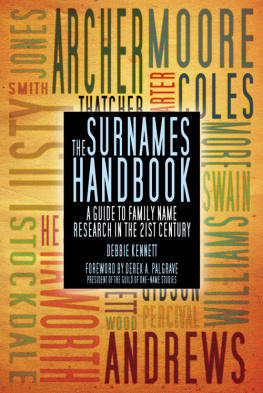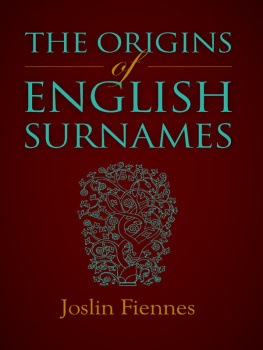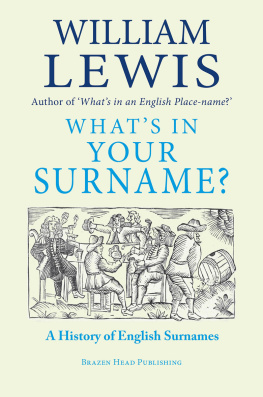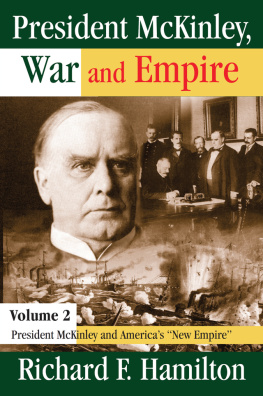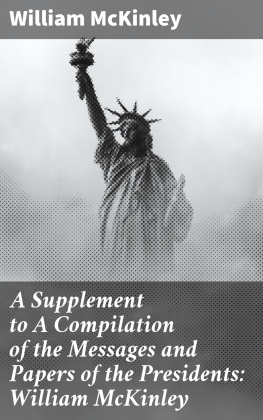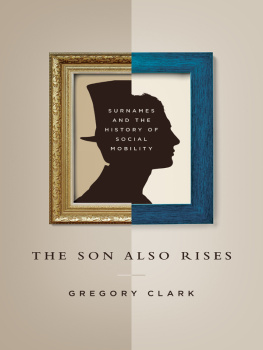A History of British SurnamesApproaches to Local History
General Editor: David Hey
Local history has been a spectacularly successful growth area in recent years, among professional historians and enthusiastic amateurs alike. In this new series, Longman will be publishing books on particular themes and aspects of the subject, written by experts for a student and lay readership. It will include practical volumes that explore the methodology of local research, and volumes that themselves illuminate the hidden lives of ordinary people in times past.
Already published:
A History of British Surnames Richard McKinley
A History of English Field-Names John Field
Oral History and the Local Historian Stephen Caunce
A History of British Surnames
Richard McKinley
First published 1990 by Longman Group Limited
Second impression 1995
Published 2013 by Routledge
2 Park Square, Milton Park, Abingdon, Oxon 0X14 4RN
711 Third Avenue, New York, NY 10017, USA
Routledge is an imprint of the Taylor & Francis Group, an informa business
Copyright 1990, Taylor & Francis.
All rights reserved. No part of this book may be reprinted or reproduced or utilised in any form or by any electronic, mechanical, or other means, now known or hereafter invented, including photocopying and recording, or in any information storage or retrieval system, without permission in writing from the publishers.
Notices
Knowledge and best practice in this field are constantly changing. As new research and experience broaden our understanding, changes in research methods, professional practices, or medical treatment may become necessary.
Practitioners and researchers must always rely on their own experience and knowledge in evaluating and using any information, methods, compounds, or experiments described herein. In using such information or methods they should be mindful of their own safety and the safety of others, including parties for whom they have a professional responsibility.
To the fullest extent of the law, neither the Publisher nor the authors, contributors, or editors, assume any liability for any injury and/or damage to persons or property as a matter of products liability, negligence or otherwise, or from any use or operation of any methods, products, instructions, or ideas contained in the material herein.
ISBN 13: 978-0-582-01869-3 (pbk)
British Library Cataloguing in Publication Data
McKinley, Richard, 1921
A history of British surnames. (Approaches to local history).
1. British surnames. Etymology
I. Title II. Series
929.420941
Library of Congress Cataloging in Publication Data
McKinley, R. A. (Richard Alexander)
A history of British surnames/Richard McKinley,
p. cm. (Approaches to local history)
Includes index.
1. Names, PersonalGreat Britain. 2. English language-EtymologyNames.
I. Title. II. Series.
CS2505.M36 1990
929.420941dc20 | 89-12303 CIP |
It is a hundred years ago now since Dr H. P. Guppy published his Homes of Family Names in Great Britain, that pioneering attempt to analyse the geographical distribution of British surnames and to point to their origins. Other amateurs, notably C. W. Bardsley, followed in his path, but it was not until Professor P. H. Reaney published his Dictionary of British Surnames in 1958 and The Origins of English Surnames nine years later that the results of systematic scholarly research were made available in print. Reaney was a Professor of English Language interested in the meaning, formation and development of names. His publications marked a great advance in our understanding of the subject. For a time it seemed that we could go no further.
Many a local historian, however, must have felt dissatisfied on reading the explanation of a surname offered in Reaneys dictionary. The purely linguistic approach seemed inadequate. Detailed knowledge of the topography and documentary history of a parish or a neighbourhood often pointed to a different interpretation, especially in those areas of scattered settlement where the names of farms and hamlets are the same as surnames peculiar to the district. The approach of the local historian was needed to complement that of the specialist in old languages. It was particularly fortunate then that when Dr Marc Fitch endowed a research fellowship for the study of surnames in the Department of English Local History at the University of Leicester Richard McKinley should have been appointed to the post.
In the days before the computer was brought to the aid of historical investigation Richard McKinleys card indexes and his painstaking methods of recording and analysing were regarded with some awe by his colleagues. He brought not only a thorough technical expertise but a wide general knowledge to bear on the interpretation of his material. He proceeded county by county, through Norfolk and Suffolk to Oxfordshire, Lancashire and Sussex, and now in semi-retirement he is working on Devon. Meanwhile, his postgraduate student, Dr George Redmonds, published his study of the surnames of the West Riding of Yorkshire. In this way, widely-scattered parts of the country, with very different patterns of settlement, illuminated the subject as a whole.
In this present work Richard McKinley brings together the fruits of these years of labour. Interest in the origins and spread of surnames is higher than ever before. To the ranks of local historians have been added armies of family historians for whom the origin of a name is the ultimate quest. This book is written in non-technical language that the informed amateur historian and genealogist can understand. It follows older works in the ways in which it categorises surnames, but adds considerably to the linguistic dimension by using surnames to shed light on many aspects of social history. In particular, it draws attention to the complex patterns of population mobility that have always characterised British society. Despite this considerable movement, however, core families have remained remarkably attached to their places of origin. Even today certain types of surnames help to provide a distinctive flavour to local societies throughout the land. It is clear from Richard McKinleys work that the study of surnames is of interest not only to those who are tracing their ancestors but to historians who wish to identify the peculiar character of local societies. An understanding of the ways that surnames have arisen and ramified since the middle ages is now a prime requirement for the social historian as well as the linguist.
DAVID HEY
The aim of this book is to provide a history of British surnames and of their development for the reader without any specialised knowledge of the subject. An exploration of the processes by which surnames evolved will enable genealogists, family historians, and local historians to put into context, against a general background of surname development, evidence collected about individual surnames or families, or about the body of surnames present in individual localities. A further object of the book is to explain how to investigate the meaning and etymology of surnames, and the complications involved in the process. Surnames of some types were at first largely confined to particular regions, and some individual surnames arose only in one area of Britain. These factors provide some clues about where, geographically, to look for some surnames, and the evidence for this will be discussed. It is not intended to provide either a dictionary of British surnames, though many individual names will be mentioned, or a guide to tracing pedigrees. Works of both kinds exist already, and are discussed in the advice on further reading at the end of the book. The scope and nature of the book have been much influenced by research into surnames over many years and by contacts with genealogists and family historians, including a large body of correspondence, from which the need for a work on the subject has become evident.





